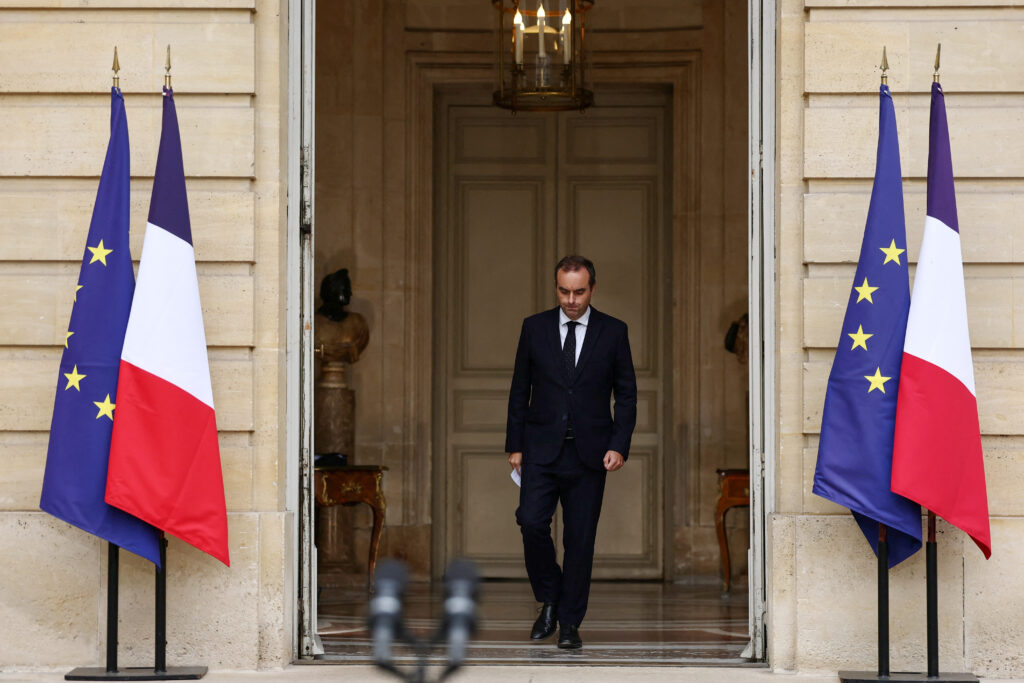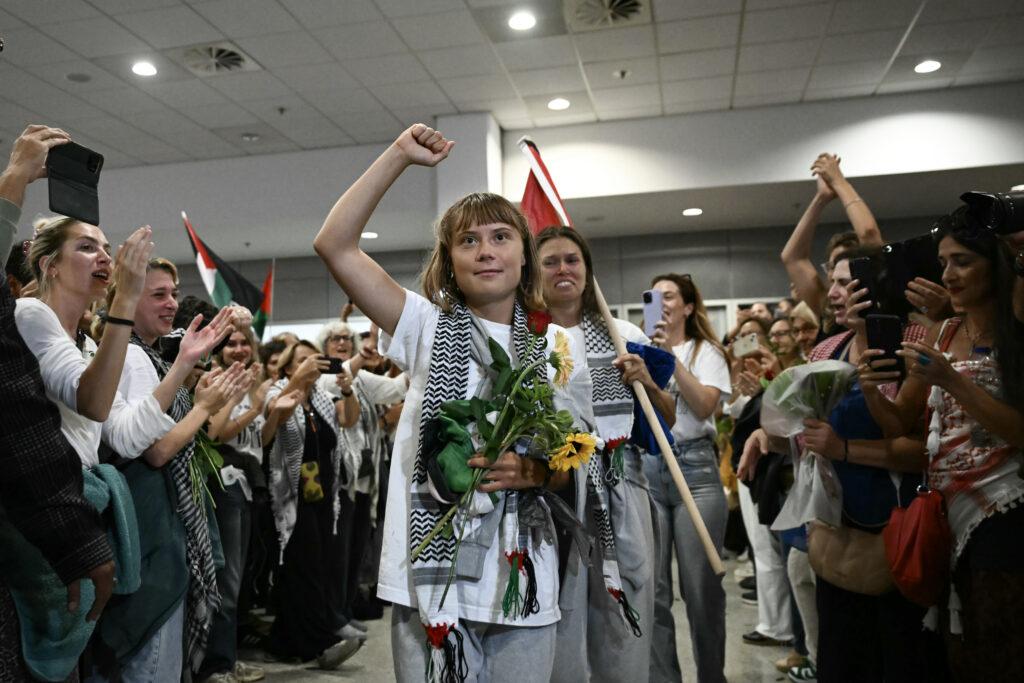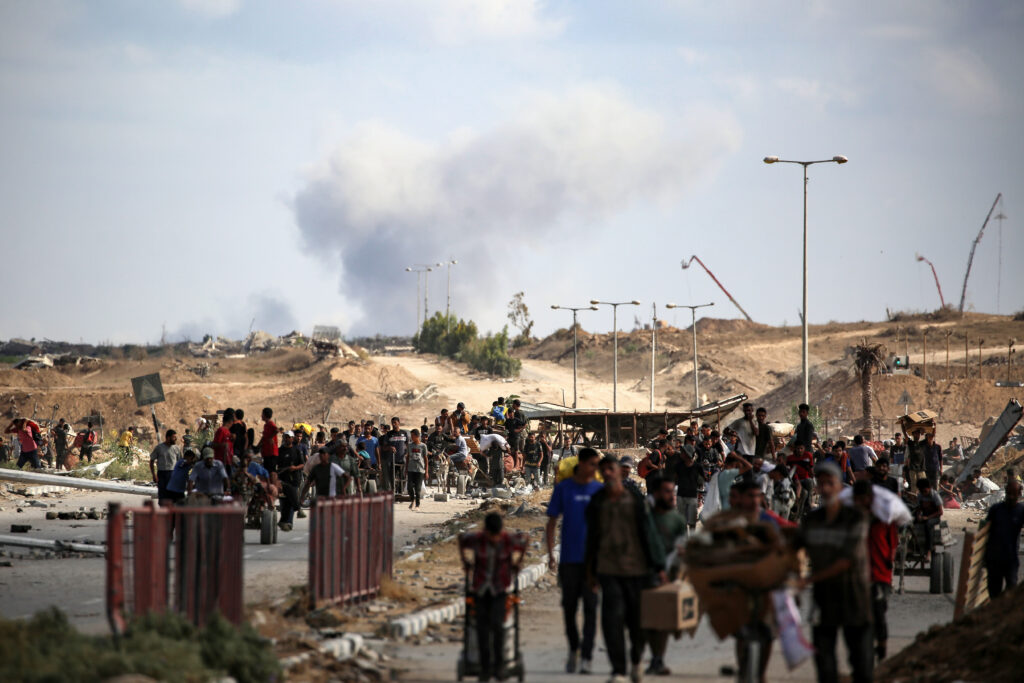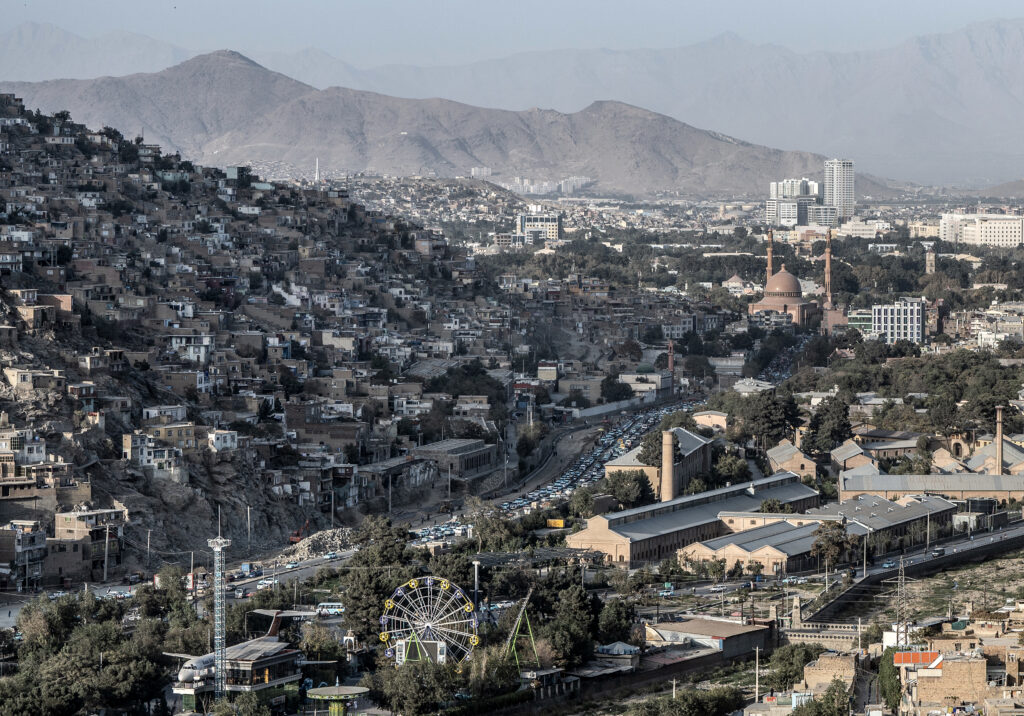AFP Asia Business
Paris stocks slide amid French political upheaval, Tokyo soars
Stock markets were mixed Monday as a deepening political crisis in France sent Paris into a tailspin while a new Japanese ruling party leader boosted Tokyo and the AI investment boom lifted US stock indices to fresh heights.Gold pushed ever closer to $4,000 an ounce as the US government shutdown and expected interest cuts from …
Paris stocks slide amid French political upheaval, Tokyo soars Read More »
Greta Thunberg lands in Greece among expelled Gaza flotilla activists
Swedish activist Greta Thunberg landed in Greece on Monday alongside scores of fellow campaigners expelled from Israel after trying to ship aid to Gaza, AFP journalists saw.The 22-year-old climate campaigner was one of hundreds of people who had boarded a flotilla that tried to break through an Israeli blockade of the war-stricken territory, with many complaining on their return to Europe of mistreatment at the hands of the Israeli authorities.Thunberg and 160 others landed at Athens International Airport, where crowds of activists welcomed them.She called the Global Sumud Flotilla “the biggest ever attempt to break Israel’s illegal and inhumane siege by sea”.”That this mission has to exist is a shame,” she added, urging the world to act to prevent Israel’s “genocide” of the Palestinians.”We are not even seeing the bare minimum from our governments,” Thunberg said.Activists unfurled a huge Palestinian flag in the arrivals hall and chanted: “Freedom for Palestine” and “Long live the flotilla!”- Parliamentarian ‘beaten’ -One of those landing in Greece, Rima Hassan, a French-Palestinian member of the European Parliament, reported having been hit by Israeli police after the flotilla was intercepted.”I was beaten by two police officers when they put me in the van,” she told AFP.Hassan said she and other detainees were kept in groups of up to 15 per cell on mattresses in a high-security Israeli prison.Yasmin Acar, a member of the flotilla’s steering committee, said the detainees were “treated like animals” and “terrorists”.”We were physically assaulted, we were deprived of sleep,” Acar said. “We did not have any clean water. The first 48 hours, there was no food, no water at all.”Israel has rejected the accusations of mistreatment as untrue.The Greek foreign ministry said the “special repatriation flight” that landed in Athens carried 27 Greeks and 134 other nationals from 15 European countries.Israel’s foreign ministry said on Monday it had deported 171 activists overall to Greece and Slovakia.Bratislava’s foreign ministry confirmed that one Slovak had returned to the central European country, along with nine other people from the Netherlands, Canada and the United States.The flotilla departed from Barcelona in Spain in early September and was intercepted by the Israeli navy off Egypt last week.Israel has branded the flotilla an offshoot of Hamas, the Palestinian Islamist movement that it is battling to destroy in Gaza.It said the boats violated a prohibited zone and that little humanitarian aid was found on board the vessels.Israeli police said more than 470 people aboard the flotilla boats were arrested.Israel’s foreign ministry told AFP that 138 flotilla participants remained in detention in Israel.
Indirect talks on ending Gaza war begin in Sharm El-Sheikh: Egypt media
Delegations from Hamas and Israel on Monday began indirect talks in the Egyptian resort town of Sharm El-Sheikh on ending the nearly two-year war in Gaza, Egyptian state-linked media reported.Al-Qahera News, which is linked to state intelligence, said the delegations “are discussing preparing ground conditions for the release of detainees and prisoners”, in line with a proposal from US President Donald Trump to halt hostilities.”Egyptian and Qatari mediators are working with both sides to establish a mechanism” for the exchange of hostages held in Gaza for the Palestinian prisoners in Israeli jails, they added.Behind closed doors and under tight security, negotiators will speak through mediators shuttling back and forth, only weeks after Israel tried to kill Hamas’s lead negotiators in a strike on Qatar.The Hamas delegation, led by top negotiator Khalil al-Hayya who survived the attack in Doha, held a meeting with Egyptian intelligence officials ahead of the talks, according to an Egyptian security source.This round of negotiations, launched on the eve of the second anniversary of Hamas’s October 7, 2023 attack that sparked the war, “may last for several days”, said a Palestinian source close to Hamas’s leadership.”We expect the negotiations to be difficult and complex, given the occupation’s intentions to continue its war of extermination,” he told AFP.Trump, whose envoy Steve Witkoff and son-in-law Jared Kushner are expected in Egypt, has urged negotiators to “move fast” to end the war in Gaza, where Israeli strikes continued on Monday.At least seven Palestinians were killed in the latest Israeli air strikes, according to Mahmud Basal, spokesman for Gaza’s civil defence agency.AFP footage showed explosions in the Gaza Strip, with plumes of smoke rising over the skyline, even after US Secretary of State Marco Rubio said Israel must stop bombing the territory.- ‘Require several days’ -Both Hamas and Israel have responded positively to Trump’s proposal, but reaching an agreement on the details is set to be a herculean task.The plan envisages the disarmament of Hamas, which the militant group is unlikely to accept.It also provides for the full withdrawal of Israeli forces from Gaza, but Israel’s Prime Minister Benjamin Netanyahu has vowed to redeploy troops “deep inside” the territory while securing the release of hostages.According to the Palestinian source, the initial hostage-prisoner exchange will “require several days, depending on field conditions related to Israeli withdrawals, the cessation of bombardment and the suspension of all types of air operations”.Previous rounds of negotiations have also stalled over the names of Palestinian prisoners the Islamist group proposed for release.Negotiations will look to “determine the date of a temporary truce”, a Hamas official said, as well as create conditions for a first phase of the plan, in which 47 hostages held in Gaza are to be released in return for hundreds of Palestinian detainees.Mirjana Spoljaric, head of the International Committee of the Red Cross, which has coordinated previous exchanges, said its teams were standing at the ready “to help bring hostages and detainees back to their families”.The ICRC said it was ready to facilitate aid access, which must resume “at full capacity” and be distributed safely across the territory, where the UN has declared a famine.- ‘MOVE FAST’ -Posting on his Truth Social platform on Sunday, Trump praised “positive discussions with Hamas” and allies around the world including Arab and Muslim nations.”I am told that the first phase should be completed this week, and I am asking everyone to MOVE FAST,” he wrote.On Monday, Egyptian President Abdel Fattah al-Sisi praised Trump’s plan saying it offered “the right path to lasting peace and stability”.A Palestinian source close to Hamas said it would halt its military operations in parallel with Israel stopping its bombardment and withdrawing its troops from Gaza City.Israeli military chief Lieutenant General Eyal Zamir warned if the negotiations failed, then the military would “return to fighting” in Gaza.Militants seized 251 hostages during their October 7, 2023 attack, 47 of whom are still in Gaza. Of those, the Israeli military says 25 are dead.According to Trump’s plan, in return for the hostages, Israel is expected to release 250 Palestinian prisoners with life sentences and more than 1,700 detainees from Gaza taken during the war.Hamas has insisted it should have a say in the territory’s future, though Trump’s roadmap stipulates that it and other factions “not have any role in the governance of Gaza”.Under the proposal, administration of the territory would be taken up by a technocratic body overseen by a transitional authority headed by Trump himself.”We hope Trump will pressure Netanyahu and force him to stop the war,” said Ahmad Barbakh, from the Al-Mawasi area.”We want the prisoner exchange deal to be completed quickly so that Israel has no excuse to continue the war.”Hamas’s October 2023 attack resulted in the deaths of 1,219 people, mostly civilians, according to an AFP tally of Israeli official figures.Israel’s retaliatory offensive has killed at least 67,160 Palestinians, according to health ministry figures in the Hamas-run territory that the United Nations considers reliable.burs-bha/dv
Israel, Hamas due in Egypt for ceasefire talks
Delegations from Hamas, Israel and the United States are due to convene in Egypt for talks on Monday, with President Donald Trump urging negotiators to “move fast” to end the nearly two-year war in Gaza.Both Hamas and Israel have responded positively to Trump’s proposal for an end to the fighting and the release of captives in Gaza in exchange for Palestinians held in Israeli jails.Negotiators hope to iron out details in indirect talks, due to begin on the eve of Hamas’s October 7, 2023 attack on Israel, which sparked the war.Trump’s plan envisages the disarmament of Hamas, which the militant group is unlikely to accept.It also provides for the full withdrawal of Israeli forces from the Gaza Strip, but Israel’s Prime Minister Benjamin Netanyahu has vowed to redeploy troops “deep inside” the territory while securing the release of hostages.Previous rounds of negotiations have also stalled over the names of Palestinian prisoners the Islamist group proposed for release.Hamas’s lead negotiator Khalil al-Hayya, who was targeted with other leaders from the group in Israeli strikes in Doha last month, was to meet with mediators from Egypt and Qatar in Cairo on Monday, a senior official from the group told AFP, ahead of talks in the Egyptian resort town of Sharm El-Sheikh.Authorities have given scant details on the logistics of the talks, which are being held behind closed doors under tight security, with mediators shuttling back and forth between the two sides.Negotiations will look to “determine the date of a temporary truce”, the Hamas official said, as well as create conditions for a first phase of the plan, in which 47 hostages held in Gaza are to be released in return for hundreds of Palestinian detainees.Mirjana Spoljaric, head of the International Committee of the Red Cross, which has coordinated previous exchanges, said Monday its teams were standing at the ready “to help bring hostages and detainees back to their families”.The ICRC said it was ready to facilitate aid access, which must resume “at full capacity” and be distributed safely across the territory, where the UN has declared a famine.- ‘MOVE FAST’ -Posting on his Truth Social platform on Sunday, Trump praised “positive discussions with Hamas” and allies around the world including Arab and Muslim nations.”I am told that the first phase should be completed this week, and I am asking everyone to MOVE FAST,” he wrote.On Monday, Egyptian President Abdel Fattah al-Sisi praised Trump’s plan saying it offered “the right path to lasting peace and stability”. Netanyahu, who has expressed hope that the hostages could be released within days, said his government’s delegation would be departing for Egypt on Monday for the talks.The White House said Trump had also sent two envoys to Egypt — his son-in-law Jared Kushner and Middle East negotiator Steve Witkoff.AFP footage on Monday showed several explosions in Gaza, with plumes of smoke rising over the skyline, even after US Secretary of State Marco Rubio urged Israel to stop bombing the territory.”You can’t release hostages in the middle of strikes, so the strikes will have to stop,” Rubio told CBS.A Palestinian source close to Hamas said it would halt its military operations in parallel with Israel stopping its bombardment and withdrawing its troops from Gaza City.On Sunday, 40-year-old Muin Abu Rajab in the city’s Al-Rimal neighbourhood said air strikes had decreased, and that Israeli tanks had “slightly pulled back”.Gaza’s civil defence agency, a rescue force operating under Hamas authority, said Israeli attacks killed at least 20 people across the territory on Sunday. Israeli military chief Lieutenant General Eyal Zamir warned Sunday that if the negotiations failed, the military would “return to fighting” in Gaza.Militants seized 251 hostages during their October 7, 2023 attack, 47 of whom are still in Gaza. Of those, the Israeli military says 25 are dead.According to Trump’s plan, in return for the hostages, Israel is expected to release 250 Palestinian prisoners with life sentences and more than 1,700 detainees from the Gaza Strip taken during the war.- No role for Hamas -Hamas has insisted it should have a say in the territory’s future, though Trump’s roadmap stipulates that it and other factions “not have any role in the governance of Gaza”.Under the proposal, administration of the territory would be taken up by a technocratic body overseen by a transitional authority headed by Trump himself.”We hope Trump will pressure Netanyahu and force him to stop the war,” said Ahmad Barbakh, a resident of the Al-Mawasi area.”We want the prisoner exchange deal to be completed quickly so that Israel has no excuse to continue the war.”Hamas’s October 2023 attack resulted in the deaths of 1,219 people, mostly civilians, according to an AFP tally of Israeli official figures.Israel’s retaliatory offensive has killed at least 67,160 Palestinians, according to health ministry figures in the Hamas-run territory that the United Nations considers reliable.burs/csp/ser
UN rights council launches probe into violations in Afghanistan
The UN Human Rights Council decided on Monday to launch a probe into serious rights violations in Afghanistan, amid growing alarm over the Taliban’s measures targeting women and girls.The United Nations’ top rights body decided to set up an investigation to gather and preserve evidence of international crimes.A draft resolution brought forward by the European Union was adopted without a vote by the 47-country council in Geneva.”Four years since the Taliban takeover by force, the human rights situation has only deteriorated amidst a deepening humanitarian crisis,” said Denmark’s ambassador Ib Petersen, introducing the resolution on behalf of the EU.The Taliban has “entrenched repression” and laid waste to civic space in Afghanistan, he said.”This council has a duty to react and stand in solidarity with the people of Afghanistan,” said Petersen, stressing that the probe would address long-standing impunity.The resolution sets up an ongoing independent investigation “to collect, consolidate, preserve and analyse evidence of international crimes and the most serious violations of international law”.Its scope notably includes violations and abuses against women and girls.It will also prepare files to facilitate independent criminal proceedings.”The mechanism will be able to preserve testimonies and stories of victims,” an EU spokesperson told AFP.- ‘Segregation, domination, disrespect’ -The Taliban returned to power in Afghanistan in 2021 and imposed a strict version of Islamic law.The Taliban government remains largely excluded from the international community, which criticises it for its repressive measures, particularly those targeting women.Afghan women can no longer practise many professions or travel without a male chaperone, and are banned from studying after the age of 12, walking in parks or going to gyms.The resolution “deplores the Taliban’s institutionalisation of its system of discrimination, segregation, domination, disrespect for human dignity and exclusion of women and girls”.Colombia’s ambassador Gustavo Gallon said Afghan women and girls were facing institutionalised repression “which simply aims to delete them from public life”.”All of the Afghan population are suffering in a climate of hunger, displacement and repression,” its representative said.While it did not call for a vote, council member China disassociated itself from the consensus, saying the resolution “fails to acknowledge the positive progress achieved” in Afghanistan.”Afghanistan has taken various measures for stability, economic growth and improvement of people’s livelihood,” the Chinese representative insisted.Fereshta Abbasi, Afghanistan researcher for the NGO Human Rights Watch, told AFP that the investigation “puts the Taliban and all others responsible for past and ongoing serious crimes in Afghanistan on notice that evidence is being collected and prepared so they may someday face justice”.




